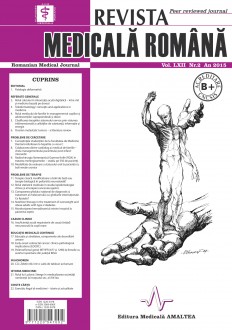SELECT ISSUE

Indexed

| |

|
|
|
| |
|
|
|

|
|
|
|
|
|
|
HIGHLIGHTS
National Awards “Science and Research”
NEW! RMJ has announced the annually National Award for "Science and Research" for the best scientific articles published throughout the year in the official journal.
Read the Recommendations for the Conduct, Reporting, Editing, and Publication of Scholarly work in Medical Journals.
The published medical research literature is a global public good. Medical journal editors have a social responsibility to promote global health by publishing, whenever possible, research that furthers health worldwide.
NUTRITION THERAPY IN THE TREATMENT OF OVERWEIGHT AND OBESE ADULTS WITH TYPE 2 DIABETES
ABSTRACT
It is well known the role of diet in the management of overweight and obese type 2 diabetic patients. Even a modest weight loss (5% to 10% of total body weight) is associated with improvements of cardiovascular risk factors. The traditional recommendations regarding the intake of macronutrients are: carbohydrate intake 45% to 65% of total energy, a total fat intake ≤ 35% of total energy (with reduction of saturated and trans fat intake and increase monounsaturated fatty acids intake) and protein intake 15% to 20% of total energy. The recent guidelines recommend increased flexibility in macronutrient composition. In this article I present different dietary patterns (such as low carbohydrate diets, high protein diets, low calorie diets, very low calorie diets and Mediterranean diet) used in the management of type 2 diabetic patients, their effects on short-term outcomes as well as on long-term outcomes. Energy restriction is required for weight loss. In short-term trials high-protein, low-carbohydrate diets are more favorable for weight loss than traditional high-carbohydrate, low-fat diets. Very important in weight loss and metabolic control are the adherence to a diet and pharmacotherapy. Recently probiotic and prebiotic have been proposed as a new treatment strategy.
Keywords: diabetes, obesity, diet, weight-loss
